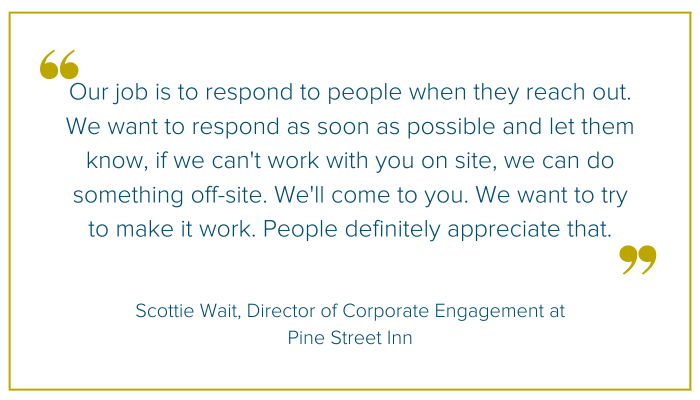As nonprofit organizations across the country regroup and recover after the past few challenging years, how they reinvent and reinvigorate their volunteer programs is proving to be an essential part of their strategic plans. As all nonprofit leaders know, there is no going back to the pre-Covid times. What there is, and where successful organizations are placing their sights, is the future, one where they can advance their missions and build stronger and more meaningful relationships, not just with donors, or volunteers.
A Nation-Wide Shift in Volunteering
According to the Volunteering and Civic Life in America report conducted by the U.S. Census Bureau and AmeriCorps, at the height of the pandemic, over fifty percent of the U.S. population aged 16 and up reported informally volunteering to help neighbors. The same report, however, found that during that same time period, only 23% of people volunteered in a formal capacity. What’s more, that figure represents a 30% decline in volunteering from pre-pandemic 2019.
Volunteer numbers continue to change and today’s statistics are still being written. However, what workers and employers do know is that the pandemic has revealed a great number of things, including a widespread and overwhelming desire to do work that resonates more deeply and personally. This was seen in ‘The Great Resignation’ where, in 2021 alone, nearly 48 million workers left their jobs, according to the Bureau of Labor Statistics. And it continues to be seen today, with companies presenting more mission-driven values and perks to appeal to a workforce looking for a career that goes deeper than the nine-to-five.
But how has this translated to volunteering in the nonprofit setting? Volunteering and volunteer hours fell dramatically during the height of the pandemic, one reason of course being the physical limitations imposed by Covid. Organizations that previously were able to accommodate large groups of volunteers had to pause or dramatically reshape those programs, and more of the work previously undertaken by volunteers, shifted to the shoulders of employees.
As the country evolves through the pandemic and more people are seeking a greater connection to a mission-driven organization, nonprofits are challenged to meaningfully and effectively connect volunteers with purposeful projects. Yet, as The State of Volunteer Engagement: Insights from Nonprofit Leaders and Funders, a study conducted by the University of Maryland’s School of Public Policy, shows, close to half of today’s nonprofit leaders feel that recruiting volunteers is a significant challenge. (By contrast, only one third felt this way twenty years ago.) Volunteer numbers, and their cumulative donated hours, continue to inch back, yet remains far from pre-pandemic figures. We’ll look at one organization leading the way in reengaging volunteers in 2023 and beyond.
Pine Street Inn: A Case Study
For Pine Street Inn, a Boston-based organization that has been the leader in providing permanent housing, emergency shelter, street outreach, and job training to homeless individuals for over fifty years, the pandemic brought significant changes to their robust and essential volunteer program. Prior to the pandemic, the organization engaged over 5,000 volunteers who donated around 33,000 hours of volunteer work annually. Today, the organization works with approximately 1,300 volunteers who provide around 3,100 hours of service.
During the pandemic, for the first time in Pine Street Inn’s history, the organization couldn’t allow volunteers on site for safety purposes. The organization shifted to rely on staff to fill in volunteer duties and tasks such as meal service, food preparation, and kitchen operation. As Scottie Wait, Pine Street Inn’s Director of Corporate Engagement shared, “It was a challenge for us. Our volunteer program was something we took for granted that was always there. Suddenly it wasn’t there and added extra pressure for staff.”
Pine Street Inn went from having groups of volunteers every day to a small, core group of people working to meet an increased demand of their services.
Re-Engaging Volunteers
Pine Street Inn has continued to shift away from larger volunteer groups in favor of smaller groups as safety remains a top priority. But they have observed that people are eager to get back into volunteering.

To re-engage that volunteer base, and recruit new support, Pine Street Inn is evolving their traditional methods of volunteering. As Wait notes, “One of the great things about Pine Street Inn is that it is so well known in Boston. A lot of people know about its history and that we have opportunities and needs. For so many of our partners, especially the corporate partners I work with, the volunteerism piece, the social engagement is really important to their teams. It’s part of their culture.”
To engage those teams, Pine Street Inn has made a number of changes to their work. For one, they’ve created new opportunities that expand beyond their traditional volunteer roles of meal preparation and meal serving. They are also listening and learning from the people they serve to evaluate shifting needs. They’ve found that a great need has been for cleaning products and Pine Street now organizes groups to assemble cleaning product care packages off-site. “Volunteers are able to make these kits for new folks moving into housing and current tenants as well. In the past we weren’t going to people’s workplaces as much as we are now, which allows us to engage more people,” Wait says.
While Pine Street Inn’s volunteer numbers are still building back up, they are eager to continue to create new roles, in new locations, and with flexible hours that can further accommodate the hybrid work lives that have shifted so much since 2020. “Our job is to respond to people when they reach out,” Wait says. “We want to respond as soon as possible and let them know, if we can’t work with you on site, we can do something off-site. We’ll come to you. We want to try to make it work. People definitely appreciate that. We get inquiries every week from companies looking for volunteer opportunities. I’ve been in this business for over 23 and I’ve seen that motivation grow over the years.”
Lasting Success
As organizations like Pine Street Inn evolve through the lasting impact of the pandemic, making an increased effort to meet volunteers and potential volunteers where they are is key. Expanding from a traditional volunteer model into fluid, nuanced opportunities that work for more people, may be the bridge to more successful volunteer engagement now and into the future.



